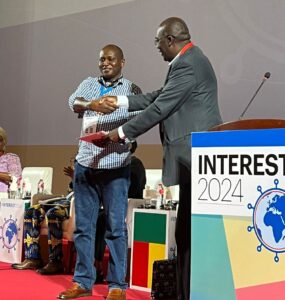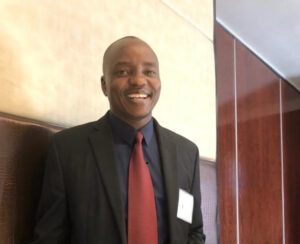In this Q&A with CARTA Communications, Melvin Ojo Agunbiade, CARTA focal person for Obafemi Awolowo University (OAU) and cohort 3 graduate reflects on his academic journey, and the professional and personal milestones achieved, having been recently promoted to the position of Associate Professor at OAU. He also offers valuable insights to inspire the next generation of researchers and scholars.
Professionally, how would you describe yourself, and what inspires you?
I am an academic, fully engaged in research and teaching in the areas of Sociology and Anthropology, and I am based at the Obafemi Awolowo University (OAU), Nigeria. My interest is in studying various aspects of sexual health, aging, gender and development, and African traditional medicine systems. These topics are important for understanding how to promote healthy aging and inclusivity in Nigeria and other countries in sub-Saharan Africa. My research aims to gather knowledge that can be used to create policies based on evidence. As a lecturer, I endeavor to impart knowledge and skills that go beyond the acquisition of education for my students but also shape and equip them to be agents of change in society.
My journey at OAU began in September 2004 when I joined as a Graduate Assistant in the Department of Sociology and Anthropology. Over the years, I advanced through the ranks to my most recent appointment as an Associate Professor which was awarded in 2023 although backdated to 2019. My role at the university involves teaching undergraduate and postgraduate courses in sociological theory, research approaches and methods in sociology and anthropology, and health and medical sociology. I also supervise undergraduates and postgraduates within the department and coordinate postgraduate programs in Sociology and Anthropology for two academic sessions.
Currently, I play key administrative roles in the department, including being the examination officer, a role that involves coordinating examination activities. Outside the department, I co-supervise doctoral candidates in nursing science and the sociology of education. Since the 2019/2020 academic session, I have been the co-coordinator of a research methodology course at the postgraduate college of the university. The development of the course was supported by CARTA through a curriculum institutionalization grant that was awarded in 2017. The course is one of the CARTA success stories at OAU. So far, the research methodology course is the first of its kind, and all doctoral candidates across the 13 faculties of the university offer this credit course in the first year of their program
How does your recent promotion to Associate Professor shape your academic journey?
This promotion marks a pivotal point in my career. Achieving the rank of Associate Professor is an achievement of great joy and pride for me, my mentors, and students. It signifies the progress I have passionately strived for and worked towards for many years. The accomplishment not only validates my dedication to academia but also serves as a stepping stone for further milestones. I am eager to contribute more to knowledge-building, mentoring, and evidence generation for the betterment of society.
What would you say has been the catalyst behind your academic and professional advancement?
Several factors have played pivotal roles in my academic and research growth including but not limited to the divine arrangements that led me into academia, the supportive environment provided by the Department of Sociology and Anthropology at OAU, and financial support to realize my academic pursuits. I received my doctorate degree in Health Sociology in 2016 from the University of the Witwatersrand, South Africa and the CARTA program fully supported this. I have also received other scholarships, such as the Commonwealth Scholarship for Distance Learning, that supported my second Master of Science Degree in Gerontology at the University of Southampton in the United Kingdom, which I completed in 2019.
My interest in gerontology was born out of my professional development plan and research interests. I owe the professional development plan to CARTA because it is from the program’s Joint Advanced Seminar Series (JASes) that I got the idea and saw this as valuable to have as a scholar. Over the years, I have found the lessons learned from the JASes indispensable in my research and teaching activities, as well as community engagement.
My progress would not have been possible without the support of my teachers as well as the mentors I have encountered along the way, including those from Author Aid and CARTA. I must also mention the encouragement I received from my undergraduate and postgraduate students, as well as the unwavering love and support from my family. The network of relationships I have fostered has provided critical input for my progress and advancement. Without this holistic support, I am certain that my achievements would not have been possible.
You have highlighted CARTA’s contribution to your development. Elaborate on specific aspects of the program that have had impact.
The invaluable support I received from CARTA, starting from pre-fellowship to post-graduation, has been instrumental in my journey. The interventions and ongoing support from CARTA have been significant, particularly during my doctoral training, capacity to generate quality research outputs, and career progression. The impacts continue to evolve, and my story in academia cannot be told without acknowledging CARTA’s role. The four CARTA JASes and the program’s way of teaching have equipped me with essential skills that are challenging to quantify, yet their impact has been evident in my research approach, knowledge sharing, knowledge building, and community engagement. I cherish every component of the CARTA curriculum. The post-graduation phase of CARTA has significantly contributed to my success in securing research grants and fellowships. I have also been able to provide support and mentorship to graduate students, and I have taken up leadership positions at OAU.
What do you hope to achieve and accomplish in your current position?
I aspire to engage in cutting-edge research, provide extensive mentoring to those around me, and foster collaborations with researchers within and outside my discipline. I aim to make substantial contributions to knowledge creation and positively impact the lives of individuals and communities through evidence-based policies and interventions.
Any points of reflection that you can offer CARTA fellows and early career researchers in Africa?
I encourage my fellow CARTA beneficiaries and early-career researchers in Africa to continuously seek opportunities to acquire new skills and collaborate with peers within and outside their discipline. Be pragmatic, persistent, and maintain a positive outlook while endeavoring to empower those around you as agents of positive change. By embracing these principles, you can navigate the challenges of academia and research, paving the way for personal growth and societal impact.





No Comments